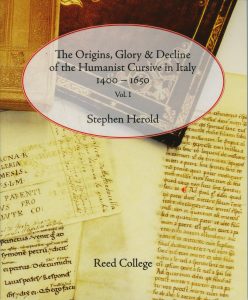Now that you’re on summer break, it’s time to think about all those movies you would have watched if you weren’t so busy studying. Want some recommendations? Check out these picks from Reed staff, faculty, students and alumni!
Author: holmesj
Book return reminder for students
Seniors:
Return all library books before midnight Thursday, May 16.
Turn in two bound copies of your thesis to the library before
12:00 noon on Friday, May 17.
All students: Return books and locker keys AND clear belongings from
desks and tables by 4:00pm on Friday, May 17.
Shen Bao Digital Archive
The very first newspaper in China with a Chinese editorial staff, the full-image and full-text Shen Bao Digital Archive gives unique insight into the transition of China from the nineteenth century until Mao.
Established in 1872, Shen Bao (historically transliterated as Shun Pao or Shen-pao) was the most influential and longest lasting commercial newspaper of before the establishment of the People’s Republic. Published in Shanghai until 1949, Shen Bao was founded by Englishman Ernest Major, but, uniquely, as a newspaper for Chinese readers, written by Chinese reporters. During its existence, Shen Bao gradually shifted from a conservative to a more liberal perspective, and played a pivotal role in the formation of public opinion in the imperial period and into the tumultuous beginnings of modern China. Shen Bao’s innovations in printing technologies, specialized use of the telegraph, and dispatch of special military correspondents gave it an edge, and today that valuable insight is preserved and made available in the Shen Bao Digital Archive.
The Shen Bao Digital Archive presents the complete collection of all issues, from the newspaper’s founding in 1872 to 1949 and is an invaluable research tool. Containing more than 2 million articles, the database is 100% full-text searchable and contains the full-image of each page. Both the full-text and the full-image are retrieved in a single search, and full text may be easily copied from the full-image as well.
You must access the database from the Reed campus. Please send any feedback to
Jim Holmes
Russian databases – Stalin Archive & Iskusstvo Kino
Streaming trial – Independent films & shorts
Through November 3, 2012, all students, faculty, and staff may access New World Cinema: Independent Features and Shorts by going directly to: http://feat.alexanderstreet.com.
The collection delivers approximately 200 full-length feature films from leading independent distributors such as Kino Lorber, First Run Features, Film Movement, MK2, and the Global Films Initiative, along with over fifty award-winning shorts. All films were shown at major festivals, many were nominated for awards, and several have won major awards. Films include the Oscar-nominated Twilight Samurai, directed by Yôji Yamada, Oscar-nominated The Scent of Green Papaya, directed by Tran Anh Hung, Oscar-nominated Dogtooth, directed by Yorgos Lanthimos, and Cannes Grand Jury Prize winner The Piano Teacher, directed by Michael Haneke.
Please send any feedback to Jim Holmes.
Fall break hours
The Reed Library is open regular hours fall break with the exception of Friday 10/12 and Saturday 10/13 – closing at 8p.
Hours for the IMC are
10/13-10/14 closed
10/15-10/19 open noon-5p
10/20 closed
10/21 resume normal hours
Special Collections and the Visual Resource Center are open regular hours.
iPhone/iPad chargers available for checkout
The IMC now has iPhone/iPad chargers available for checkout. All chargers, laptops and headphones checkout to students for the day – due at closing. Other AV equipment including projectors, camcorders, audio recorders, screens, tripods and DVD/VCRs, checkout for 3 days and can be reserved by contacting Jim Holmes in the IMC.
(503)777-7352
Online IMC Film Guide
The most frequent question in the Instructional Media Center is “What is this place?” The second most frequent question is “Can you recommend a movie?” While we love to talk film with our patrons, sometimes it’s not practical due to the long line of customers waiting eagerly to checkout one of many fantastic media resources. To that end, we created the IMC Film Guide. You may recognize this as the online version of that 3-ring binder by the kiosk we often point to when asked for such recommendations. It’s better though because it’s online.
New Book about Manuscripts in Reed’s Special Collections
The Origins, Glory & Decline of the Humanist Cursive in Italy 1400-1650 is a new title written by Reed alumnus Steve Herold ’63 about the Early Writing Collection in the Reed library’s special collections. Herold has traced the history of the italic cursive popularized by Professor Lloyd Reynolds in his calligraphy classes at Reed presented from 1938 until his retirement in 1969, when Robert Palladino continued the classes until 1984. For the last 8 years, Herold has been giving various documents to Reed’s special collections to join those collected by Reynolds. Heavily illustrated with wonderful historical examples, the title also reprints a difficult-to-find article by Stanley Morison on “Early Humanist Script and the First Roman Typeface.” It is available in the Reed bookstore ($24.95).
Calligraphy at Reed
May 22 – August 2012
This exhibit sheds some light on the history of calligraphy at Reed and the impact of Lloyd Reynolds’ teaching, showing a selection of his letterforms, correspondence, and student work. The calligraphy that Reynolds taught at Reed from the late 1930s through 1969 remains a strong presence in college life. Robert Palladino continued teaching that course through 1984, and since then there have been Paideia classes, Reunion themes, major exhibits, catalogs, and classes taught through the Cooley Gallery to school children, Reed students, and others.
Flat cases and the wall case behind the reference desk in the Hauser Library

